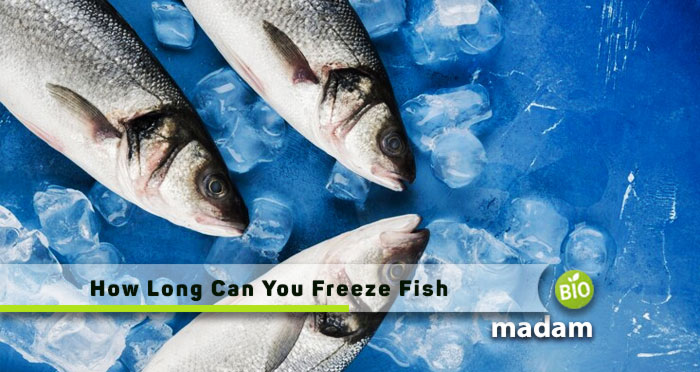Recently updated on January 2nd, 2026 at 08:38 pm
Eating fish is a healthy way to get important nutrients like protein, vitamins, and omega-3 fatty acids into your diet. However, fresh fish tends to spoil quickly, so freezing is a great option for preserving fish to enjoy later. Knowing how long different types of fish stay fresh and tasty in the freezer can help you get the most out of the fish you buy.
In this article, we’ll provide guidelines on how long you can keep various fish frozen so you can enjoy fish whenever the craving strikes, even months after purchasing it. We’ll go over what happens to fish when frozen, factors that impact how long frozen fish lasts, and approximate freezer timelines for common fish fillets and whole fish.
With the tips in this article, you can stock up on fish when the prices are best and always have a healthy, delicious frozen fish dinner option ready in your freezer.
Can You Freeze Fish?
Yes, you can freeze fish to extend its shelf life and ensure availability when needed. The process involves understanding the type of fish, the freezing method, and proper packaging. Fish like salmon freeze well but have a shorter freezer life due to higher oxidation risk. Home freezers differ from industrial ones, impacting the texture. Vacuum sealing is ideal for preserving quality. Specific guidelines exist for different scenarios, from fridge storage to thawed and vacuum-sealed fish in the freezer. Overall, freezing is a convenient method, provided proper practices are followed.
Duration Guidelines
Before delving into specific durations, it’s essential to have general guidelines for freezing fish in different forms. These are separately discussed below:
How Long is Fish Good in the Fridge?

According to the USDA guidelines, raw or fresh fish maintain optimal freshness in the fridge for 1–2 days before either cooking or freezing. Once cooked, seafood can be safely stored in the refrigerator for an extended period, offering flexibility for meal preparation and consumption.
How Long Does Cooked Fish Last in the Fridge?
Cooked fish can be safely stored in the refrigerator for 3–4 days, according to the USDA. While refrigeration slows bacterial growth, it doesn’t prevent it entirely. To ensure safety and freshness, it’s crucial to consume cooked fish within the recommended timeframe before the risk of spoilage or potential health hazards increases.
How Long Does Tuna Fish Last in the Fridge?
According to the USDA, raw tuna lasts 1–2 days in the fridge, while cooked tuna can be kept for 3–4 days. For canned tuna, it remains fresh for 1–2 days post-opening. To maintain freshness, transfer it to an airtight container, tightly cover it, and refrigerate promptly after opening. These measures help preserve the quality of tuna for optimal consumption.
How Long can Thawed Fish Stay in the Fridge?
Thawed fish should be used within one or two days, according to the USDA. To safely thaw fish, remove the packaging and place it on a plate with kitchen towels, covered with cling film, in the fridge for 12-24 hours. Raw fish in the refrigerator, at 40°F or less, is safe for 1–2 days before cooking or freezing. After cooking, seafood can be refrigerated for 3–4 days, maintaining freshness and quality.
How Long can Defrosted Fish Stay in the Fridge?
After thawing, defrosted fish should be consumed within one to two days when stored in the refrigerator, according to USDA guidelines. Prolonged storage beyond this timeframe increases the risk of bacterial growth and the potential for food poisoning. It’s crucial to prioritize prompt consumption or freezing to maintain the freshness and safety of defrosted fish.
How Long Does Fish Last in the Freezer?
According to the USDA, frozen fish remains safe indefinitely, but its flavor and texture deteriorate over time. For optimal quality, cooked fish is best frozen for up to three months, while raw fish can be stored for three to eight months. Shellfish, following USDA guidelines, should be frozen within a range of three to 12 months to maintain their quality.
How Long Does Vacuum-Sealed Fish Last in the Freezer?
Vacuum-sealed fish, stored properly in the freezer, can maintain quality for an impressive one to two years, remaining free from freezer burn or spoilage. To ensure optimal results, select a quality vacuum sealer, keep sealing bags dry, dry fillets thoroughly, check for bones, and avoid overfilling bags. When ready to use, thaw your fish appropriately for a flavorful and preserved seafood experience.

How to Freeze Fish
Freezing fish successfully involves strategic planning. Begin by ordering in bulk to minimize deliveries and account for potential industry disruptions. Choose fish varieties that freeze well, with oily fish enduring up to three months and delicate white fish best consumed within a month. Gather essential materials like ziplock freezer bags and an indelible marker pen for labeling.
Prepare the fish by washing, drying, and deciding on portions. Place it in ziplock bags, remove excess air, and label with fish type and freezing date. Lay flat in the coldest part of the freezer, monitor temperature, and enjoy optimal quality when it’s time to cook.
Can You Freeze Fish Whole?
Yes, you can freeze fish whole. When freezing an entire fish, it’s essential to wash it in cold water and dry it thoroughly. Remove the head, guts, fins, and scale the fish, leaving the skin on to protect it from drying out. You can freeze the whole fish as is or cut it into portions, such as 3/4 inch steaks or fillets, depending on your cooking preferences. Properly wrapped and sealed, whole fish can be stored in the freezer for an extended period, maintaining its quality for future use.
Can You Freeze Fish Without Cleaning Them?
While it is technically possible to freeze fish without cleaning them, it is not recommended for optimal quality. Cleaning the fish, including removing the head, guts, fins, and scaling, helps preserve the flavor and texture. If frozen without cleaning, there is a risk of off-flavors and deterioration in quality. It’s best to invest the time in proper preparation before freezing to ensure a more enjoyable culinary experience when you eventually cook and consume the fish.
Can You Re-Freeze Fish?
Re-freezing fish is generally not recommended unless the fish has been thawed in the refrigerator and has not exceeded the recommended storage time in the thawed state. When re-freezing, there is a risk of compromising the quality and safety of the fish. If you have thawed fish that you don’t intend to cook immediately, it’s advisable to cook it first and then freeze the cooked product. This helps maintain better texture and flavor while ensuring food safety.
Additional Considerations
Fresh vs. Frozen Purchase
Inspect fish at the seafood counter for signs of freshness like clear eyes, red gills, firm flesh, and a mild ocean smell. Reject fish that smells fishy or ammonia-like. Ask if the retailer has frozen fish alternatives to expand your options. Well-frozen fish can be just as nutritious and tasty as fresh.
Fat Content and Freezer Life
Fatty fish like mackerel and salmon have shorter freezer lives of 2-3 months compared to lean fish which can last 6-8 months. The polyunsaturated fats in oily fish are prone to oxidation, causing rancidity and off-flavors over time in the freezer.

Packaging Integrity
Vacuum-sealed or tightly wrapped packages prevent freezer burn which causes dry spots and texture changes. Check that packaging shows no signs of tears or loss of vacuum seal which compromises quality. Re-wrap compromised packages.
Odor Check
When thawed, fish should not smell sour or ammonia-like which indicates spoilage. Discard fish with an off-putting odor. A bright, ocean-like smell signals the fish is still fresh and good to cook. Rely on your nose for a quick quality test.
Wrapping Up
Freezing fish enables you to conveniently enjoy the health and taste benefits of seafood for an extended period. By following proper freezing guidelines, choosing suitable fish varieties, monitoring freezer temperatures, and employing quality packaging, you can preserve the freshness of fish for up to 12 months. Portioning fish before freezing allows you to thaw only what you need for a meal. With a well-stocked home freezer, you can have a diverse selection of fish fillets and steaks ready to go when you’re looking for a quick, nutritious dinner. With the proper freezing and storage methods, you’ll be ready to enjoy fresh-tasting seafood any night of the week, even months after purchasing it.
FAQs
How Long Can You Freeze Fish Fillets?
Fish fillets can be frozen for three to four months while maintaining good quality. After this period, there’s a risk of texture and taste degradation. Proper packaging, including vacuum-sealing, and adherence to recommended guidelines play a crucial role in preserving the fillets’ optimal taste and texture.
How to Freeze Fish Fillets?
To freeze fish fillets effectively, clean and dry them thoroughly. Use ziplock freezer bags, expelling excess air before sealing to prevent freezer burn. Label each bag with the fish type and freezing date. Lay fillets flat in the coldest part of the freezer, ideally using the fast freeze setting for better preservation of taste and texture.
Does Freezing Fish Kill Bacteria
Freezing fish doesn’t kill bacteria but instead halts their growth. The low temperatures in a freezer slow down the metabolic processes of bacteria, preventing them from multiplying and causing spoilage. However, it’s important to note that while freezing can preserve the fish, it may not eliminate all bacteria. Cooking the fish thoroughly is necessary to ensure food safety by killing any remaining bacteria or parasite that might be present.

Meet me; I am Paulina Zaniewska, who’s more hooked on providing the best health blog. I’ve always been so determined to compete as a nutritionist, and here I am, done with a Master’s in food technology. My brilliant performance throughout encouraged me to help people.

